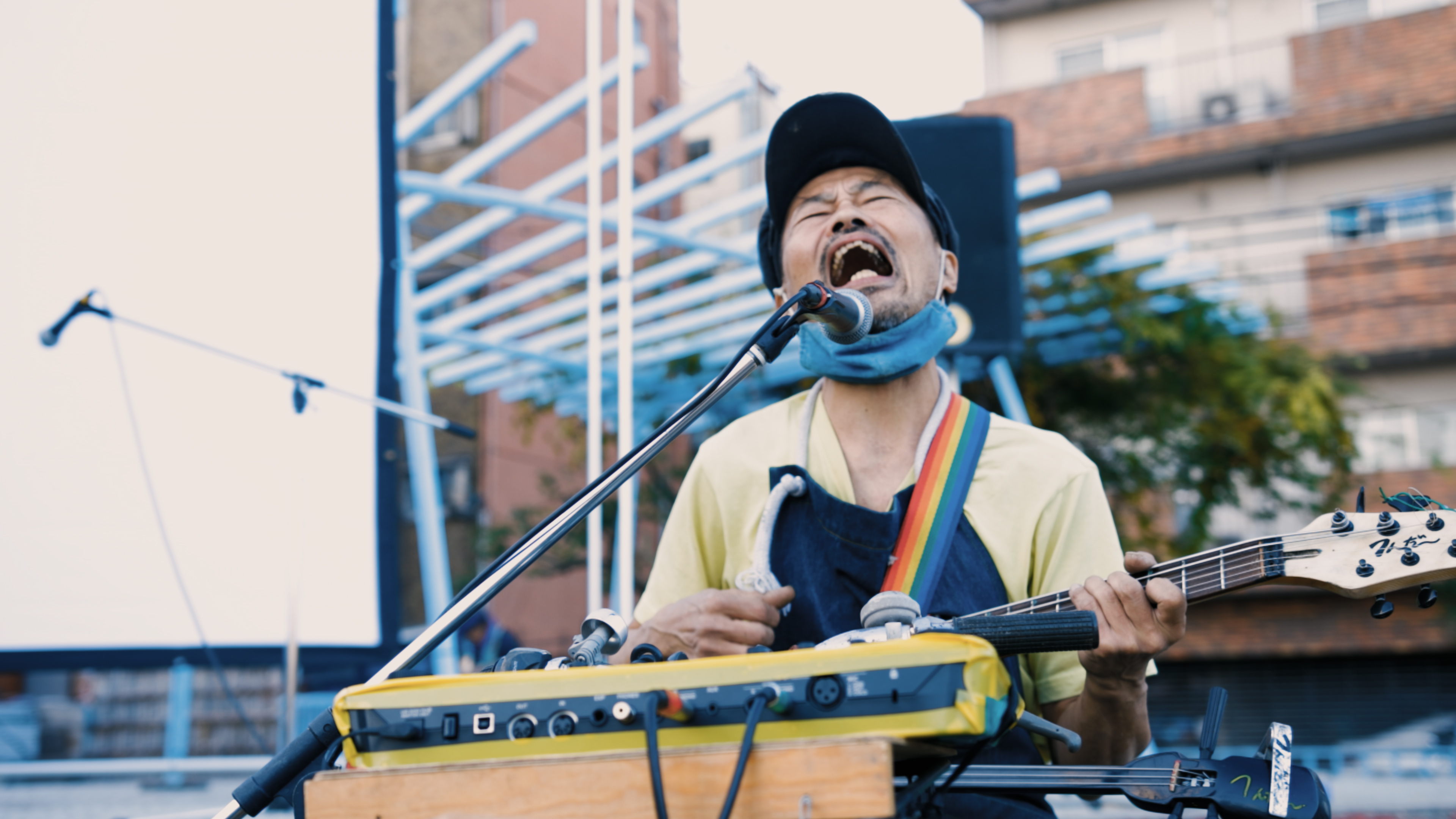Works
Short film

「ドライブ・マイ・ソーラーキッチンカー」 Drive My Solar Kitchen Car (2022)
Documentary / 20min / 4K / Stereo / Color
ビジネスマンで賑わう昼どきの兵庫県神戸市のオフィス街。 いくつも並ぶキッチンカーの中で一際、行列ができている店がある。 焼き鳥丼を看板メニューに掲げるキッチンカー「幸屋」だ。 店主のかのうさちあは長年、安心安全な食材を自ら探し求め、また自作し、そうした食材を使って料理を提供してきた。 炭火が醸し出す匂いに吸い寄せられて来た常連客の一人はこう語る。 「ここに幾つも出店者の方がいますけど、このお店だけがこの場で作ってくれるんですよ」 だがその常連客も知らない店主の姿があった。 学生時代に反原発運動に身を捧げて来たかのうは、その活動の挫折の経験から、「反対」と声を上げることよりもできることを実践する尊さを学び、自転車発電や無農薬の野菜づくりなど、多岐にわたる「実践」と「実験」を積み重ねてきた。 そして、近年、右肩上がりに上昇するガソリン代から、太陽光を活用したガソリンいらずのキッチンカーを考案。仲間たちの知恵を借り、なんとかキッチンカーを完成させたかのう。 あたたかい料理で、原発事故後に福島に移り住み、地域のお年寄りに寄り添って暮らすかつての仲間を励ましたいと、出来たてのソーラーキッチンカーで旅に出る。果たしてその旅路や如何に!?
現在、北海道には運転を停止しているものの再稼働に向けて審査が続いている原発がある。 北海道電力が保有する泊発電所がそれだ。 1988年、稼働を翌年に控え、泊発電所で試運転を止めようと原発の敷地に花を植えて抗議活動を行う学生たちの姿があった。 本作の主人公であるかのうさちあ(本名:加納知之)もその一人だ。熱量は虚しく、学生の数名は逮捕され原発も翌年稼働を開始した… あれから33年の月日を経た今、運動の失敗を今も胸に抱えながら、自分なりの仕方で環境への取り組みを試行錯誤しながら実践する主人公の取り組みを見つめた。
スタッフ
監督・撮影・編集:太田信吾
撮影・映像提供:磯桂岳
プロデューサー:川津彰信
車両:岡崎慎一
CG・合成・英語字幕翻訳:MCP
音楽協力・コーラス:クレープ娘
チンドン太鼓:細見大悟
アートディレクション:竹中香子
宣伝デザイン:内田美由紀(NORA DESIGN)
タイトルデザイン:西巻慧菜
キャスト
かのうさちあ 内田ボブ 徳井和美 岡崎慎一 中江 敏幸 前田 渉 すずき産地 1988年北海道泊原発の運転に抗議した若者のみなさま ほか
関係者
制作協力:ハイドロブラスト スタジオモンジャクシン スタジオ幸屋
撮影協力:銀河のほとり すずき産地 町分オルタナギャラリー 麦の家 BLUE SKY CAMPER PROJECT 株式会社 一般社団法人 ○と編集社
協力:じゅんぺい 関久雄 武藤類子 松川早紀 村田良文 加納家のみなさま
制作プロダクション:株式会社幸屋
文化庁 「ARTS for the future!」 補助対象事業
Director
Shingo Ota
Synopsis
At noon, the business district of Kobe, Hyōgo prefecture, is bustling. Among the several kitchen cars lined up, one of them is packed with customers. The sign says Sachia and there’s yakitori bowls on the menu. For many years, the owner Sachia Kanō, has been selecting the cleanest ingredients to serve dishes made with these ingredients. A regular customer drawn by the smell of charcoal burning said “There’s a lot of shops there, but it's the only one that cooks on the spot !”. But there is a side of the owner that this regular customer does not know. Devoting himself to the anti-nuclear movement when he was a student, he learned from the setbacks he encountered that rather being “against”, the best thing was to do something “for” a change. He went on with several experiments and practices such as a bicycle-powered generator and pesticides-free vegetables farming. Recently, considering the rise of gasoline prices, he and some friends built a kitchen car using solar energy that does not require fuel. With his newly built solar kitchen car, he goes on a journey to support his old friends who moved to the Fukushima area after the nuclear accident to help the elderly.
Currently, the non-operating Tomari nuclear power plant in Hokkaidō, owned by the Hokkaidō Electric Power Company, is being considered for restart. In 1988, the year before the launching of operations at the power plant, students protested by planting flowers on the site of the facility to stop the trial tests. The protagonist of this film, Sachia Kanō (born Tomoyuki Kanō), was one of them. Their actions eventually failed, several students were arrested and the power plant started operations the following year… 33 years later, with the bitterness of this failure still tormenting him, he goes on with his environmental efforts the best he can.
